
Netflix's speed rankings show that video streaming performance on Verizon and Comcast has been dropping for the past three to four months.
The rankings were updated this morning with data from January. Verizon FiOS dropped from sixth to seventh best in the US, swapping places with Time Warner Cable. Comcast stayed in 14th place out of 17 rated providers, while Verizon DSL dropped from 16th to 17th, trading places with Clearwire.
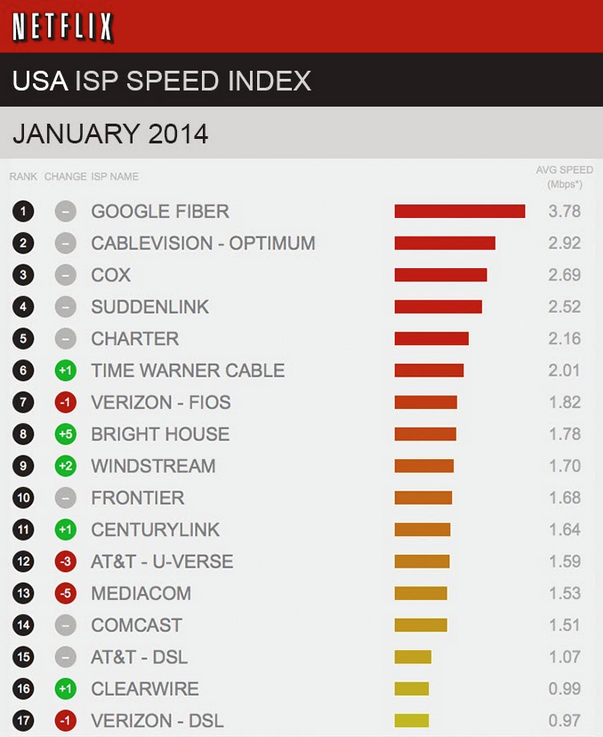
The story is really in how each provider's megabits per second changed from month to month. Verizon FiOS suffered just a tiny drop from 2.22Mbps to 2.2Mbps from October to November, but then it went down to 2.11Mbps in December and 1.82Mbps in January.
(Note that if you want to see a graph containing all ISPs, or get different data sets, check out this Netflix link. The charts in this story were generated using Netflix's tool, which rearranges the values in the y-axis depending on the data being presented. Make sure to check the Mbps numbers in the y-axis when examining each chart.)
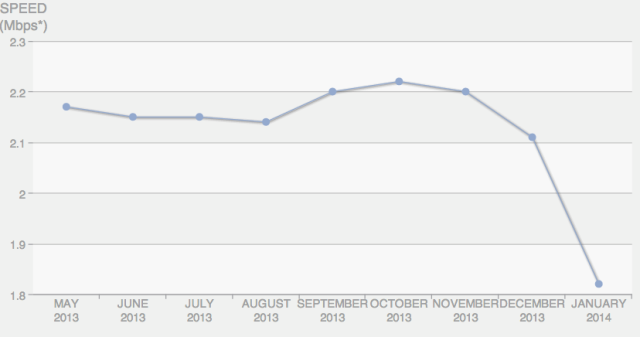
Verizon DSL dropped for four straight months from 1.42Mbps to 0.97Mbps, with the largest single-month drop occurring between December and January.
Comcast also dropped for four straight months, from 2.11Mbps in September to 1.51Mbps in January.
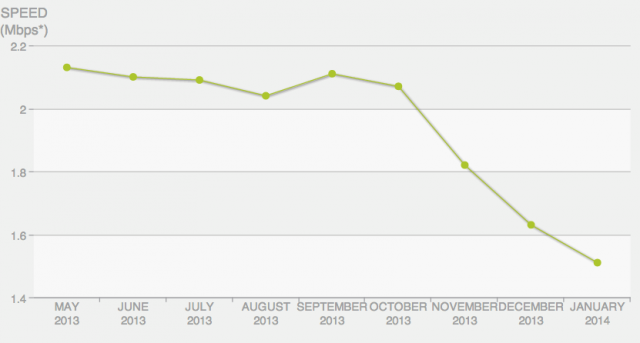
Verizon customers have been complaining about poor Netflix performance lately, so the numbers aren't necessarily a surprise. Determining the actual cause of such performance slowdowns is never easy, though. That the latest performance complaints came after Verizon's win over the FCC in a court battle over net neutrality rules led to claims that Verizon was celebrating its victory by throttling Netflix traffic.
One such claim was backed by some traceroutes and a quote from a hapless customer service representative, but we explained last week why that wasn't enough evidence to declare that Verizon is suddenly throttling Netflix as a result of the net neutrality ruling.Still, that doesn't mean Verizon isn't taking steps that degrade Netflix performance. If anything, the Netflix data shows that Verizon's performance problems started before it got the net neutrality rules overturned. And Verizon and Comcast have each garnered their share of Netflix-related complaints for months, if not years.
Netflix didn't offer any analysis of why performance would have dropped in the past few months. We do know that in the past, Verizon and Comcast have each been involved in disputes with Internet bandwidth providers, and that these disputes can prevent peering infrastructure from being upgraded. This affects all traffic, but it places a more noticeable toll on streaming video because of how much bandwidth it requires.
While the FCC's now-defunct net neutrality rules prevented Verizon from intentionally throttling specific applications, the rules never governed peering. Verizon could always harm Netflix (and other) traffic if it chose to do so simply by failing to upgrade peering infrastructure in a timely manner.
A likely explanation for recent slowdowns is that Netflix usage went up, but peering and transit bandwidth didn't. Verizon and Comcast also haven't joined Netflix's "Open Connect" content delivery network, which can improve Netflix performance by placing video caches closer to customers.After this story published, one commenter pointed out that the declines in performance came after Netflix started delivering its so-called "Super HD" and 3D video to all customers, even those whose ISPs are not members of Open Connect. This may have increased the traffic load.
Things could get worse for Verizon customers. While Comcast is still bound to follow the FCC's net neutrality rules due to conditions placed on its merger with NBCUniversal, Verizon is under no such obligation. Verizon has readily acknowledged that it would like to charge companies like Netflix for better access to its customers. Degrading performance by failing to upgrade infrastructure is one way Verizon could force Netflix's hand.
In response to Netflix's rankings, Verizon gave Ars this statement:
We state unequivocally that Verizon’s broadband Internet access services deliver a pristine user experience to our customers at any time of day on every day of the week. This has been repeatedly proven through independent testing by the Federal Communications Commission (FCC), which has conclusively demonstrated that FiOS Internet consistently delivers both download and upload speeds in excess of what we advertise. In short, our Internet customers often get more than they pay for.
How the Internet works can be complicated, and consumers should be aware of the fact that the integrity of their home Internet connection is only a portion of the streaming video quality equation. If their broadband connection is functioning correctly, the source of their frustration and the content they wish to see may be one in the same.
Verizon also pointed to a blog post it wrote last year in response to previous complaints, and the company noted that the FCC will be publishing broadband performance results as early as this month.
Comcast has not responded to our request for comment, but stated last month in a customer support forum that "[w]e are aware of these threads and the concerns expressed here. We are actively engaged. It is sensitive and we can't really say more than that right now."
Carrying Netflix traffic requires a lot of infrastructure, as the service accounts for 31.6 percent of all downstream traffic at peak times in North America, according to SandVine. Yet some ISPs have improved their Netflix speeds even as Verizon and Comcast falter. Google Fiber, Cox, and Cablevision in particular have been impressive. The comparisons to better performing ISPs place Verizon and Comcast in a bad light.
Google Fiber wins again
The Netflix data doesn't provide everything we'd want to know about performance. For example, Netflix says its "listed speeds reflect the average performance of all Netflix streams on each ISP's network." Netflix's recommended speeds range from 0.5Mbps for the most basic streams to 3Mbps for DVD quality to 12Mbps for 3D content, but we don't know what percentage of users on each network meets each given threshold.
Still, the performance drops shown by Verizon and Comcast stand out among the rest of the crowd. Few providers dropped in performance in each of the past two months, and those that did showed smaller drops than Verizon and Comcast. For example, Time Warner Cable went from 2.07Mbps in November to 2.02Mbps in December and 2.01Mbps in January. TWC shows an interesting trend, having gotten temporarily better before reverting to its usual, lower performance:
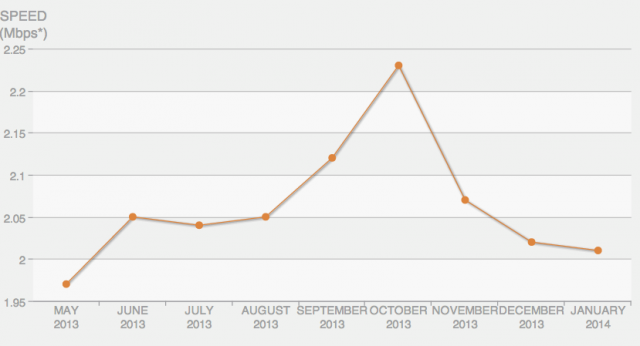
Charter dropped from 2.32Mbps in November to 2.16Mbps in January. Mediacom posted one of the biggest drops of any provider in January, but that came after an improvement in December. AT&T's U-Verse and DSL both stayed steady between November and December before posting drops in January.
Cox, meanwhile, boosted its speed two months in a row. Cablevision has improved steadily 13 months in a row, going from 2.09Mbps in December 2012 to 2.92Mbps in January 2014.
Google Fiber, which has consistently placed at the top of Netflix's US rankings, upped its speeds four months in a row from 3.41Mbps to 3.78Mbps. Yes, sometimes Internet service does actually get better:
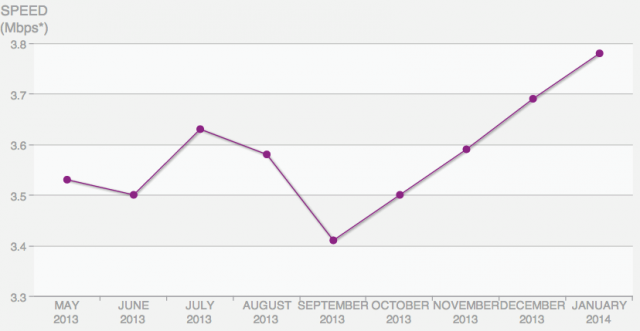
reader comments
217